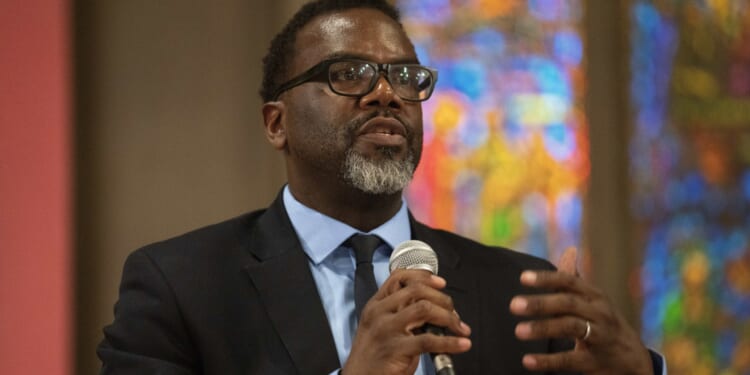Chicago Mayor Brandon Johnson describes the 2026 budget as “Protecting Chicago,” but his plan seems to do the opposite. Taxes on Artificial Intelligence, Uber rides and companies with 100+ employees are the biggest revenue sources.
Chicago Mayor Brandon Johnson unveiled his $16.6 billion budget for fiscal year 2026, covering a $1.15 billion deficit with massive tax hikes, temporary spending adjustments and one-time revenue fixes.
While Johnson kept his promise not to raise property taxes and eliminated the grocery tax, his plan targets the “ultra rich” through a spate of progressive tax measures. He calls it “Protecting Chicago.”
Instead of new taxes that risk driving away investment and making Chicago’s already dire economic situation worse, Johnson should protect the city by curbing spending and making it easier for the economy – not the tax burden – to grow.
Spending
Even as total spending falls because of waning federal grant revenue, the city’s corporate fund will expand to nearly $6.1 billion, $270 million higher than last year’s budget.
Personnel expenditures supported by the corporate fund will increase by over 14% from last year, or $496.1 million. This surge is driven primarily by rising wages and healthcare costs.
New and increased taxes and fees (total $570 million)
Increases the city’s cloud tax ($333 million)
Although it received heavy criticism from business leaders when it was raised last year, Chicago’s personal property lease transaction tax or “cloud tax” would become the highest in the nation in 2026, increasing from 11% to 14%. The nearly 27% hike will hit computer software and artificial intelligence platform services used by tech companies, such as Apple and Amazon.
This will undermine the governor’s ambition to turn Illinois into a technology and quantum computing hub, and it will raise prices for thousands of small and up-and-coming businesses.
Revives the corporate head tax as the “community safety surcharge” ($100 million)
The budget revives the corporate head tax under a new name: the “community safety surcharge.” Once described as a “job killer ” by former Chicago Mayor Rahm Emanuel, this tax will charge any business with over 100 employees $21 a month per employee.
Rideshare tax hike ($65 million)
Johnson’s plan for 2026 includes a tax increase on rideshare services by expanding the areas where Lyft and Uber riders must pay an additional congestion surcharge. The tax will also shift from a flat fee to a 10.25% tax rate. Currents rates sit at between $1.13 to $5.00 depending on drop off location or time of day.
Creates social media amusement and responsibility tax ($31 million)
The proposal introduces a new sin tax on social media companies dubbed the social media amusement and responsibility tax or SMART tax – a first of its kind nationwide. Under the measure, companies with over 100,000 active users will pay 50 cents for each user beyond that threshold. Revenue from the tax will help finance the city’s free mental health clinics and crisis response teams.
Creates an online sports-betting tax ($26 million)
Chicago would add a 10.25% tax to revenues for sports betting companies such as DraftKings and FanDuel.
Hemp tax ($10 million)
The city will add a $2 tax on hemp products, such as delta-8 and THCA.
Yacht tax ($4 million)
The boat mooring tax will triple from 7% to 23.25%.
Vacant building fees ($400,000)
To combat blight in the South and West sides of the city, Johnson’s plan increases the mortgage renewal fees for vacant properties.
Savings ($331 million)
Hiring freezes and personnel savings ($101 million)
The city claims it will save $51 million from vague personnel savings and $50 million from a hiring freeze on long-standing vacant jobs across various departments. While police vacancies will remain, police overtime will be capped.
Lower advanced pension payments ($118 million)
Chicago already has the worst-funded local pension systems in the nation. To mitigate this, the city has been making advanced payments into the system. While these payments have provided some marginal improvement, funding levels remain far below Chicago’s 90% target. Johnson’s 2026 budget plan will lower advanced pension payments, likely reversing recent progress and worsening the city’s pension crisis.
Other efficiency savings ($112 million)
The city will allegedly save $112 million from other operational efficiencies, which include reducing vendor contract costs, selling vacant land, consolidating the city’s real estate assets and organizational streamlining.
One-time revenue
The budget also relies on sweeping a record $1 billion tax increment financing surplus, almost double last year’s. While this could enable Chicago Public Schools to pay its disputed $175 million pension reimbursement, reliance on fund sweeps fail to resolve structural deficits and can worsen on the city’s already bottom-of-the barrel bond ratings.
Conclusion
Instead of fund sweeps and settling political scores through “tax-the-rich” schemes, Johnson’s budget strategy for Chicago should focus on structural reform that corrects years of financial mismanagement and fosters long-term economic growth.
Economic growth in the city has been anemic and inflation rates have remained elevated, leading the cost of services to outpace revenue. Chicago’s unemployment rate still sits far ahead of the national average, and the city continues hemorrhaging residents and businesses. Johnson’s proposed tax measures won’t protect Chicagoans; they’ll make matters worse.
Only by controlling spending, properly cutting departmental waste and creating an economic and tax environment that encourages investment and helps businesses grow, will the city achieve fiscal stability and provide real opportunity for residents.










